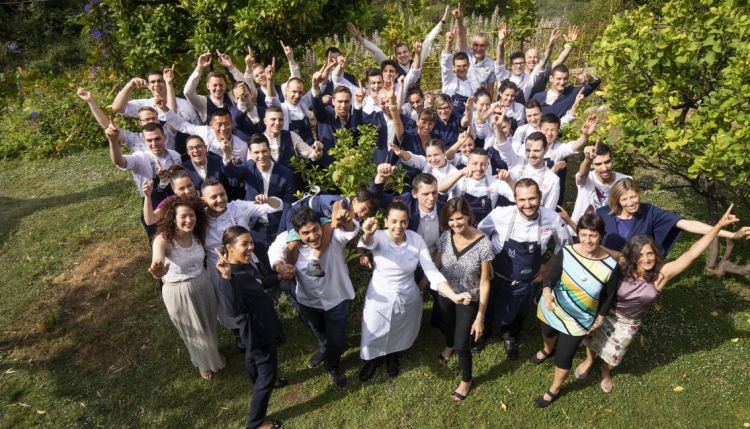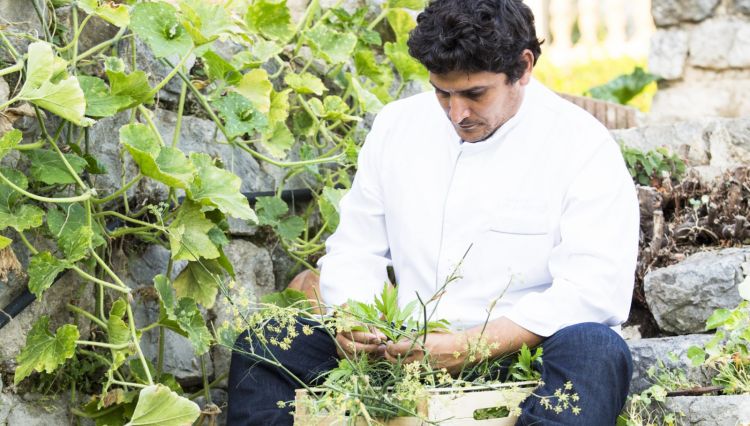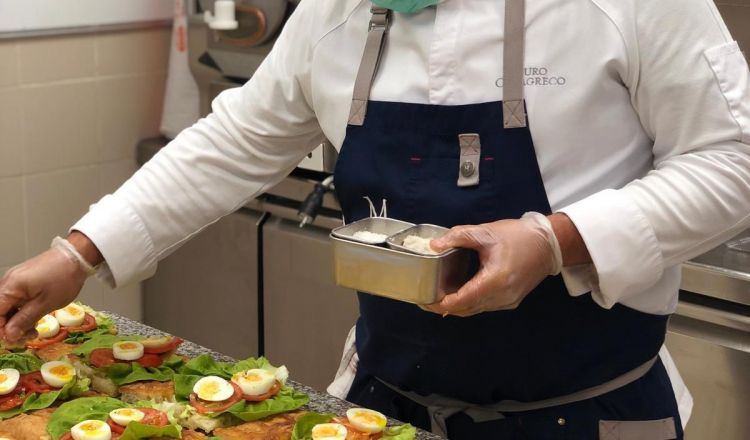The night of the 14th of March Mirazur, Mauro Colagreco’s three-starred restaurant in Mentòn, at the top of The World’s 50 Best 2019, offered its last service. After weeks of uncertainties, after schools and universities were closed on the 12th, France decided overnight to close all shops, bars, restaurants and non-essential public services. Two days later, on the 16th, president Macron addressed the nation using very serious words («We’re in a sanitary war») and announced the beginning of a lockdown for the entire country, following the decision taken by the Italian government the previous week.
We video-called Mauro Colagreco in Mentòn, where during these months while he was closed, he took care of many people and many things. We asked him to tell us, a few weeks before the restaurant’s reopening, his experience of this emergency, and how he intends to go back to work. He’s wearing a work outfit and a mask, renovating one of the floors of Mirazur.
«We are open for bookings from June 3rd – he confirms - even though perhaps restaurants in green areas [France was divided into green, orange and red areas depending on the spread of the virus] might reopen only after the 11th of June». «We received bookings from all around the world, but we realise many will be cancelled until governments won’t open borders. Despite all the difficulties, we must remain positive and relaunch the economy». The keywords, for this reopening, for the Argentinian chef, are adaptability, creativity, sacrifice, optimism, and commitment to reactivate and nourish the clients’ trust.

The entire team of Mirazur is at home since March 14th. The French government, through a sort of redundancy fund, pays 84% of the staff’s salary, but Colagreco is committed to contribute to that
Fourteen restaurants in three different continents, old parents and a son far away, in Argentina, and not reachable for now, hundreds of people, his staff to take care of – there are 70 people in the staff of Mirazur alone – a great responsibility, the utmost uncertainty on the future together with the impossibility of making any plans or forecasts. Where did Mauro Colagreco find all the clearness and inner strength to face all this?
«In Mirazur’s vegetable garden – he said without hesitation – it’s working in my vegetable garden that kept me positive and gave me the strength and clarity to understand how to face this situation». Contact with the earth, following its rhythms, observing nature’s ability to regenerate and react, helped the chef to overcome the difficult weeks of quarantine and inspired his attitude and the positive strength with which he responded to this global emergency. Perhaps it is for this reason too that the vegetable garden, Les Sanctuaries de Mirazur, has a crucial place in the projects of the chef from Argentina. Spreading over 5 hectares, the cultivated area of the garden, now 2.5 hectares will be extended so it will supply not only Mirazur but also Pecora Negra, the pizzeria that Colagreco opened last summer in Mentòn, and Mitron Bakery, where in the heart of the town the chef bakes bread and more using ancient wheat varieties and organic flour in an oven from the early 20th century. The importance of the garden in the offer of the three-starred restaurant will also change: «The chef will no longer decide what to grow based on what he wants to cook – Colagreco explains – it will be the production of the vegetable garden that will influence the chef’s creativity». This revolutionised approach gives Les Sanctuaries de Mirazur a crucial role.
And again it’s from the vegetable garden that came the vegetable baskets sold to locals, during the emergency (the chef, unlike many of his colleagues decided not to offer delivery service: «Those who come to Mirazur don’t come just to eat, but to enjoy an experience too», he explained). The garden also offered the fruits and vegetables with which Colagreco prepared, twice a week, meals for the homeless and for the staff at the hospital of Mentòn, at work during the emergency.
“People find in the crisis itself the strength to overcome it” wrote Ernesto Sabato. We recall the current words of the Argentinian writer («he studied in La Plata, my hometown, but was from Rojas, my grandfather’s hometown»): “Human beings can transform obstacles into new roads because life needs the space of a crack to be reborn”.

Through that crack, life is reborn and light seeps: the answer, according to Colagreco, is to transform this health emergency into acts of poetry. The idea of the patron of Mirazur to fight Covid is Dostoevskyan: transform the ugly and the negative into gestures of light and life. Beauty will save the restaurant industry, it will give back faith to the consumer, it will make consumers want to dine out and thus relaunch the economy. In practice, for instance, the panels they’ll use at Mirazur to separate the tables for health safety will be designed by Argentinian artist Leandro Erlich, reproducing honeycombs. «We started from the octagonal shape of the foundations of Mirazur – Colagreco explains – and ended with the hexagonal one of the cells forming the honeycombs». Both these shapes are full of work, creativity, beauty: «Life is born in the honeycombs», the chef points out.
And then: alcoholic gel is aseptic; it recalls the risk of contagion and the disease. Guests at Mirazur instead of the gel (which of course will be used by all the staff, just like in the weeks before closing: «our protocols already included measuring the temperature and sanitising hands every half hour») will be given a tray with water and essences, flowers and of course sanitising liquid, so they can experience the ablution ritual that is dear to eastern cultures. Transforming new protocols and sanitary rules into acts of beauty and poetry: this is the recipe of the three-starred chef to overcome the crisis.
Mauro Colagreco is convinced that life continues, that we’ll find a way to move on, «just like our grandparents did after the war»: of course he is aware we must work hard and make sacrifices, but also that this crisis is an opportunity because «all the world had to stop for a moment».

Twice a week, during the lockdown, Mauro prepared 50 meals for the staff at the hospital in Mentòn
The chefs’ everyday acts, Colagreco never misses a chance to repeat this, have a political, cultural, philosophical and ethic value (as he already told us when presenting his project CARNE). Because they work with food, they have a direct contact with the reality that our planet is living and that according to the chef is connected with this pandemic: intensive breeding, the use of chemicals and pesticides, unlimited fishing, the overexploited of our natural resources, pollution. This forced pause offered us a moment to reset our priorities and understand what and how much we are willing to sacrifice to promote an urgent and necessary change. Hence the need of asking oneself some questions: what kind of society, and in what kind of world we want our children to live? What is the greatest richness?
Not the economic one, according to Colagreco. The solution is not going back to running as fast as before – even though of course, at first, we will need to work twice as hard to recuperate the months of lockdown. Hence the decision of moving, from next year, to just one service per day, to improve in terms of quality of life, have some time for oneself, for others, for one’s family and for the employees.
Mirazur starts again from a renewed awareness and it does so by betting on beauty and on its garden. These are the two pillars on which Mauro Colagreco founds his reopening, to face the challenges that the present offers him and all the other professionals in the restaurant industry, all around the world.
Among The Just, who without receiving the attention of the world take care of it and save it, Jorge Luis Borges, included “he who takes pleasure in tracing an etymology”, “the potter, contemplating a colour and a form. / The typographer who sets this page well, though it may not please him”. “He who is grateful for the existence of music”, “he who strokes a sleeping animal”. And firstly: “A man who cultivates his garden, as Voltaire wished”. “These people, unaware – Borges wrote – are saving the world”.
Translated into English by Slawka G. Scarso